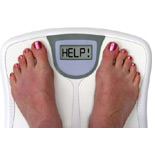Weight Loss Resources
Hundreds of articles about weight loss ...
Weight Loss Mathematics Explained
The Mathematics of Weight Loss

Weight loss is essentially a case of simple mathematics. If you use up more calories than you consume you will lose weight. What could be easier!
Unfortunately, life is never that simple, and there are always a few other equations to take into account.
The basics maths
- To lose 1lb per week requires a reduction of 500 calories per day, achieved by eating less and exercising more.
- To maintain her weight, a woman should eat 1,900 calories a day, and a man should eat 2500.
- To lose weight a woman should consume 1,400 calories a day, and a man should consume no more than 2000.
- Ideally you shouldn't go lower than 1,400 calories, and you should never ever go lower than 1,000 a day.
- The key to a good diet is sustainability and longevity. A diet with a calorie count lower than 1,400 becomes very difficult to sustain, meaning that once you stop trying to lose weight, the pounds will pile back on.
What's the best way to create a calorie deficit?
Try to lose more calories through exercise as opposed to nutrition. If nutrition is restricted past the point of basic daily functioning then the metabolic rate starts to drop and the body can actually start to store fat as protection against a possible 'famine'.
Calculating your optimum heart rate during exercise
Use the equation 220 minus your age to give you an approximate figure for your maximum heart rate (the figure you should go no higher than when exercising).
Using this figure you can then calculate what percentage of your maximum you're working at during exercise. To maximise your cardiovascular benefits and calorie expenditure it is recommended that you work around 60-80% of your maximum heart rate.
If you enjoy exercising and don't mind pushing yourself, then incorporate sessions into your plan where you do try to work harder. The harder you work (75-95% max heart rate), the more calories expended during the session and in the 24 hours after, as you have revved up your metabolic rate. Just be aware that the harder you work, the less duration you will be able to maintain it for, so don't expect the session to last for as long.
Disclaimer
You are advised to seek medical advice before making any changes to your diet or lifestyle with an aim of weight loss. This website and the content provided should not be used by persons under 18, by pregnant or nursing women, or individuals with any type of health condition, except under the direct supervision of a qualified medical professional. The information contained in these articles, and elsewhere on this website, is provided for educational and entertainment purposes only, and is not intended to replace, and does not constitute legal, professional, medical or healthcare advice or diagnosis and may not be used for such purposes. Continue...

